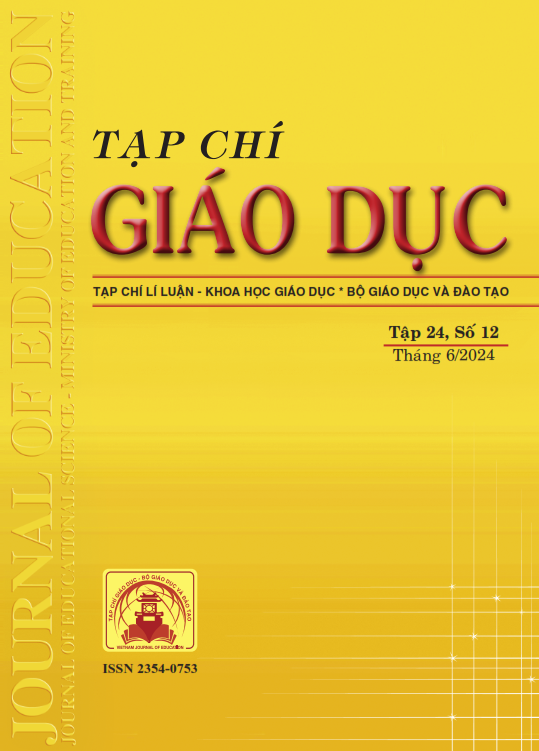Vận dụng mô hình “Lớp học đảo ngược” vào dạy học lập trình cho sinh viên năm thứ nhất tại Trường Đại học Sư phạm - Đại học Đà Nẵng
Tóm tắt
The flipped classroom model has become a modern educational trend, especially notable in programming education. This article focuses on applying the Flipped Classroom Model (FCM) in teaching Python programming to first-year university students. The aim is to optimize the learning process by promoting self-study and enhancing practical experience. The study was conducted on a class of students at the University of Education, University of Danang, during the second semester of the 2022-2023 academic year. The results indicate that the flipped classroom model positively impacts learning performance and student satisfaction, encouraging active participation in learning and developing self-learning skills, which are vital in programming education.
Tài liệu tham khảo
Bergmann, J., & Sams, A. (2012). Flip Your Classroom: Reach Every Student in Every Class Every Day. International Society for Technology in Education.
Bosu, M. F., & Sultana, K. Z. (2019). Supporting self-regulated learning with ICT. International Journal of Education and Development using Information and Communication Technology (IJEDICT), 15(2), 5-20.
Bujdoso, G., Novac, O.C., Szimkovics, T. (2017). Developing cognitive processes for improving inventive thinking in system development using a collaborative virtual reality system. International Conference on Cognitive Infocommunications, CogInfoCom, 79-84.
Carbonaro, A. (2019). Good practices to influence engagement and learning outcomes on a traditionalintroductory programming course. Interactive Learning Environments, 27(7), 84-96. https://doi.org/10.1080/10494820.2018. 1504307
Codagnone, C., Liva, G., Gunderson, L., Misuraca, G., & Rebesco, E. (2021). Europe’s Digital Decade and Autonomy. Policy Department for Economic, Scientific and Quality of Life Policies.
Chaudhry, M. A., & Kazim, E. (2021). Artificial Intelligence in Education (AIEd): A high-level academic and industry note 2021. AI And Ethics, 2(1), 157-165. https://doi.org/10.1007/s43681-021-00074-z
Durak, H. Y. (2020). Modeling different variables in learning basic concepts of programming in flipped classrooms. Journal of Educational Computing Research, 58(1), 160-199. https://doi.org/10.1177/0735633119827956
Elmaleh, J., & Shankararaman, V. (2017). Improving student learning in an introductory programming course using flipped classroom and competency framework. In 2017 IEEE Global Engineering Education Conference (EDUCON), pp. 49-55. IEEE.
Erol, O., & Kurt, A. A. (2017). The effects of teaching programming with scratch on pre-service information technology teachers’ motivation and achievement. Computers in Human Behavior, 77, 11-18. https://doi.org/10.1016/j.chb.2017.08.017
Etemi, B. P., & Uzunboylu, H. (2020). The effects of flipped learning method on students’ perception and learning of Java programming. International Journal of Engineering Education, 36(4), 1372-1382.
Gil, A. J., & Mataveli, M. (2017). Learning opportunities for group learning: An empirical assessment from the learning organization perspective. Journal of Workplace Learning, 29(1), 65-78. https://doi.org/10.1108/JWL-02-2016-0009 Lage, M. J., Platt, G. J., & Treglia, M. (2000). Inverting the Classroom: A Gateway to Creating an Inclusive Learning Environment. The Journal of Economic Education, 31, 30-43. https://doi.org/10.2307/1183338
Papaspyrou, N. S., & Zachos, S. (2021). Teaching Programming through Problem Solving: The Role of the Programming Language. Proceedings of the 2013 Federated Conference onComputer Science and Information Systems (pp. 1533-1536).
Pears, A. N. (2010). Enhancing student engagement in an introductory programming course. 2010 IEEE Frontiers in Education Conference (FIE), Arlington, VA, USA, 2010, pp. F1E-1-F1E-2, https://doi.org/10.1109/FIE.2010. 5673334
Robins, A., Rountree, J., & Rountree, N. (2003). Learning and Teaching Programming: A Review and Discussion. Computer Science Education, 13(2), 137-172. https://doi.org/10.1076/csed.13.2.137.14200
Tucker, B. (2012). The flipped classroom. Education Next, 12(1), 82-83.
Tran, V. H., Le, H. T., Phan, T. C., Hoang, L. P., & Phan, T. M. (2022). Flipped classroom in online teaching: a high school experience. Interactive Learning Environments, 1-17. https://doi.org/10.1080/10494820.2022.2120020
van Rossum, G. (2011). An Introduction to Python (Revised and Updated for Python 3.2). Network Theory Ltd.
Vygotsky, L. (1978). Mind in society: The development of higher psychological processes. Harvard University Press.
Wang, M., & Zheng, X (2021). Using Game-Based Learning to Support Learning Science: A Study with Middle School Students. The Asia-Pacific Education Researcher, 30(2), 167-176. https://doi.org/10.1007/s40299-020-00523-z
Tải xuống
Đã Xuất bản
Cách trích dẫn
Số
Chuyên mục
Giấy phép

Tác phẩm này được cấp phép theo Ghi nhận tác giả của Creative Commons Giấy phép quốc tế 4.0 .












